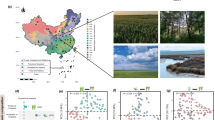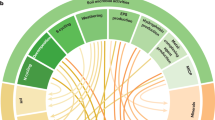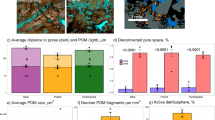Abstract
THE heavy metal content of various plants has been related to sources of air pollution1. Trees growing near London, England, were found to contain more lead than those growing in the country2. Grass near a highway was found to contain more lead than grass further away3. These studies involved root type plants that obtain their nourishment from the soil.
This is a preview of subscription content, access via your institution
Access options
Subscribe to this journal
Receive 51 print issues and online access
$199.00 per year
only $3.90 per issue
Buy this article
- Purchase on Springer Link
- Instant access to full article PDF
Prices may be subject to local taxes which are calculated during checkout
Similar content being viewed by others
References
Lagerwerff, J. V., and Specht, A. W., Environmental Sci. Technol., 4, No. 7 583 (1970).
Warren, H. V., and Delavault, R. E., J. Sci. Food Agric., 13, 96 (1962).
Cannon, H. L., and Bowles, J. M., Science, 137, 765 (1962).
Ruhling, A., and Tyler, G., Botaniska Notiser, 3 (1968).
Wherry, E. T., and Buchanan, Ruth, Ecology, 7, 303 (1926).
Wherry, E. T., and Capen, Ruth G., Ecology, 9, 501 (1928).
Author information
Authors and Affiliations
Rights and permissions
About this article
Cite this article
MARTINEZ, J., NATHANY, M. & DHARMARAJAN, V. Spanish Moss, a Sensor for Lead. Nature 233, 564–565 (1971). https://doi.org/10.1038/233564b0
Received:
Revised:
Issue Date:
DOI: https://doi.org/10.1038/233564b0
This article is cited by
-
Sulfur isotopic signatures of water-soluble sulfate in needles of Pinus Massoniana Lamb in two Chinese areas
Environmental Earth Sciences (2015)
-
Baseline element concentrations in soils and plants, Bull Island, Cape Romain National Wildlife Refuge, South Carolina, U.S.A.
Water, Air, and Soil Pollution (1994)
-
Lichens as monitors of aerial heavy metal pollutants in and around Kampala
Bulletin of Environmental Contamination and Toxicology (1987)
-
Air pollution patterns in two cities of Colombia, S. A. According to trace substances content of an epiphyte (Tillandsia recurvata L.)
Water, Air, and Soil Pollution (1984)
-
Element content of mosses as possible indicators of air pollution
Archives of Environmental Contamination and Toxicology (1979)
Comments
By submitting a comment you agree to abide by our Terms and Community Guidelines. If you find something abusive or that does not comply with our terms or guidelines please flag it as inappropriate.



